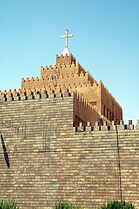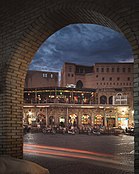
Back Arbil Afrikaans أربيل Arabic ܐܪܒܝܠ (ܡܕܝܢܬܐ) ARC اربيل ARZ Ərbil Azerbaijani اربیل AZB Erbil, Irak BCL Эрбіль Byelorussian Арбіль BE-X-OLD Арбил Bulgarian
Erbil
ھەولێر Hewlêr | |
|---|---|
|
Top-bottom, R-L: Downtown Erbil Mudhafaria Minaret • Nature in Erbil Textile Museum • Citadel of Erbil Cathedral of Saint Joseph • View outside Erbil citadel Empire World | |
| Nickname(s): | |
| Coordinates: 36°11′28″N 44°00′33″E / 36.191188°N 44.009189°E | |
| Country | |
| Autonomous region | |
| Governorate | Erbil |
| Government | |
| • Mayor | Omed Khoshnaw |
| Area | |
| • Total | 115 km2 (44 sq mi) |
| • Land | 113 km2 (44 sq mi) |
| • Water | 2 km2 (0.8 sq mi) |
| Elevation | 390 m (1,280 ft) |
| Population | |
| • Estimate (2018)[2] | 879,071 |
| • Density | 10,435/km2 (27,030/sq mi) |
| Time zone | UTC+3 (AST) |
| Postal code | 44001 |
| Area code | 066 |
| Website | HawlerGov.org |
Erbil (Arabic: أربيل, Arbīl;[3] Syriac: ܐܲܪܒܹܝܠ, Arbel[4][5]), also called Hawler (Kurdish: هەولێر, Hewlêr),[6] is the capital and most populated city in the Kurdistan Region of Iraq. The city is in the Erbil Governorate.[7]
Human settlement at Erbil may be dated back to the 5th millennium BC.[8] At the heart of the city is the ancient Citadel of Erbil and Mudhafaria Minaret. The earliest historical reference to the region dates to the Third Dynasty of Ur of Sumer, when King Shulgi mentioned the city of Urbilum. The city was later conquered by the Assyrians.[9][10]
In the 3rd century BC, Erbil was an independent power in its area. It was conquered for a time by the Gutians. Beginning in the late 2nd century BC, it came under Assyrian control. Subsequent to this, it was part of the geopolitical province of Assyria under several empires in turn, including the Median Empire, the Achaemenid Empire (Achaemenid Assyria), Macedonian Empire, Seleucid Empire, Armenian Empire, Parthian Empire, Roman Assyria and Sasanian Empire, as well as being the capital of the tributary state of Adiabene between the mid-second century BC and early 2nd century AD. In ancient times the patron deity of the city was Ishtar of Arbela.[11]
Following the Muslim conquest of Persia, the region no longer remained united, and during the Middle Ages, the city came to be ruled by the Seljuk and Ottoman empires.[12]
Erbil's archaeological museum houses a large collection of pre-Islamic artifacts, particularly the art of Mesopotamia, and is a centre for archaeological projects in the area.[13] The city was designated as the Arab Tourism Capital 2014 by the Arab Council of Tourism.[14][15] In July 2014, the Citadel of Erbil was inscribed as a World Heritage Site.[16]
- ^ "ھەولێر". chawykurd.com. چاوی کورد. Archived from the original on 30 July 2021. Retrieved 2 December 2020.
- ^ "Iraq: Governorates & Cities".
- ^ "أربيل" (in Arabic). Al Jazeera. Retrieved 28 December 2019.
- ^ "Search Entry". assyrianlanguages.org. Retrieved 26 May 2021.
- ^ Khan, Geoffrey (1999). A Grammar of Neo-Aramaic: The Dialect of the Jews of Arbel. BRILL. p. 2. ISBN 978-90-04-30504-5.
There are a number of variant forms of the name Arbel. The form Arbel, which is used throughout this book, is the Neo-Aramaic form of the name. The Arabic-speaking Jews of the town refer to it as Arbīl or Arwīl. In Classical Arabic sources it is known as Irbīl. The Kurds call it Hawler, which appears to have developed from the form Arbel by a series of metatheses of consonants. The name appears to be of non-Semitic origin. It is first found in cuneiform texts dating to the third millennium B.C., where it usually has the form Urbilum.
- ^ "Hewlêr dixwaze Bexda paşekeftiya mûçeyan bide" (in Kurdish). Retrieved 28 December 2019.
- ^ Danilovich, Alex (12 October 2018). Federalism, Secession, and International Recognition Regime: Iraqi Kurdistan. Routledge. ISBN 9780429827655.
- ^ Novice, Karel (2008). "Research of the Arbil Citadel, Iraq, First Season". Památky Archaeological (XCIX): 259–302.
- ^ Villard 2001
- ^ Hamblin, William J. (2006). Warfare in the Ancient Near East to 1600 BC. Routledge. p. 111. ISBN 0-415-25589-9.
- ^ Porter, Barbara Nevling, "Ishtar of Niniveh and her collaborator, Ishtar of Arbela, in the Reign of Assurbanipal", Iraq, vol. 66, pp. 41–44, 2004
- ^ Georges Roux – Ancient Iraq
- ^ Cite error: The named reference
ReferenceAwas invoked but never defined (see the help page). - ^ Erbil named 2014 Arab Tourism Capital Archived 8 July 2015 at the Wayback Machine. Retrieved 30 January 2014
- ^ "Erbil: Kurdish City, Arab Capital", Rudaw. Retrieved 30 January 2014
- ^ Centre, UNESCO World Heritage. "Erbil Citadel". UNESCO World Heritage Centre. Retrieved 28 October 2022.
© MMXXIII Rich X Search. We shall prevail. All rights reserved. Rich X Search








